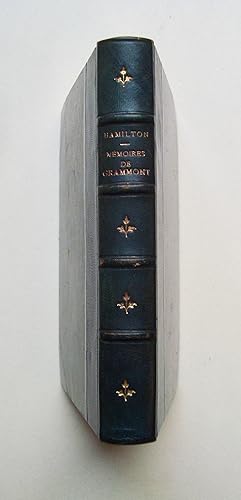philibert comte gramont (6 risultati)
Filtri di ricerca
Tipo di articolo
- Tutti i tipi di prodotto
- Libri (6)
- Riviste e Giornali (Nessun altro risultato corrispondente a questo perfezionamento)
- Fumetti (Nessun altro risultato corrispondente a questo perfezionamento)
- Spartiti (Nessun altro risultato corrispondente a questo perfezionamento)
- Arte, Stampe e Poster (Nessun altro risultato corrispondente a questo perfezionamento)
- Fotografie (Nessun altro risultato corrispondente a questo perfezionamento)
- Mappe (Nessun altro risultato corrispondente a questo perfezionamento)
- Manoscritti e Collezionismo cartaceo (Nessun altro risultato corrispondente a questo perfezionamento)
Condizioni Maggiori informazioni
- Nuovo (Nessun altro risultato corrispondente a questo perfezionamento)
- Come nuovo, Ottimo o Quasi ottimo (1)
- Molto buono o Buono (3)
- Discreto o Mediocre (Nessun altro risultato corrispondente a questo perfezionamento)
- Come descritto (2)
Legatura
- Tutte
- Rilegato (5)
- Brossura (Nessun altro risultato corrispondente a questo perfezionamento)
Ulteriori caratteristiche
- Prima ed. (1)
- Copia autograf. (Nessun altro risultato corrispondente a questo perfezionamento)
- Sovracoperta (Nessun altro risultato corrispondente a questo perfezionamento)
- Con foto (3)
- Non Print on Demand (6)
Lingua (1)
Spedizione gratuita
- Spedizione gratuita in U.S.A. (Nessun altro risultato corrispondente a questo perfezionamento)
Paese del venditore
Valutazione venditore
-
Hardcover. Condizione: Good. xxxvi, 376 pages : portraits ; 23 cm Hardcover. Publisher's red cloth with gold lettering and armorial seal. Old split to spine edge (but reglued). Clean, unmarked pages. Ships daily.
-
EUR 25,00
EUR 15,00 per la spedizione da Francia a U.S.A.Quantità: 1 disponibili
Aggiungi al carrelloParis : Paulin, 1847 - petit in-12 (9,5x14,5 cm) demi-veau, dos à nerfs avec fleurons, titre et auteur dorés, 364 pages - petites rousseurs sinon bon état - Livres.
-
Memoirs of Count Grammont by Count A. Hamilton. Translated from the French with notes and illustrations. In two volumes.
Editore: London : WH Reid,, 1828
Da: Antiquariat Hartmut R. Schreyer, Augsburg, Germania
EUR 140,00
EUR 12,00 per la spedizione da Germania a U.S.A.Quantità: 1 disponibili
Aggiungi al carrellovii, 285 u. 331 S. mit 68 Stahlstich-Porträts. Gr-8°. Schwarze Leder-Einbande der Zeit mit reicher Goldprägung u. Goldschnitt. »The Quarto-Edition«. - Philibert de Gramont (1621-1707), seit 1679 comte de Toulongeon, war ein französischer Offizier, Hof- und Edelmann am Hof Ludwigs XIV. Er wurde vor allem durch seine Liebesabenteuer bekannt und hinterließ Memoiren, die ein wertvolles Bild vom Hofleben im 17. Jahrhundert geben. - (leichte Gebrauchsspuren, Ecken etw. bestoßen; tlw. stockfleckig).
-
Leather Binding. Condizione: Near Fine. No Jacket. First Edition. 8vo - over 7¾" - 9¾" tall. Near fine (hints of fading & wear). 8vo ca. 275/vol+pl Edited with notes by Sir Walter Scott. With 12 etchings by L. Boisson after original designs by C. Delort. Memoir of the notorious French gambler, libertine and attendee a t the court of Louis XIV (1621-1707), written by his brother-in-law (partly from dictation by Gramont himself); originally published in France in 1713 . Attractively bound in contemporary 3/4 green morocco over cloth, top edge gilt., marbled endpapers, spines elaborately triple-ruled in gilt with geometric designs. The binding has an appropriately Anglo-French flavor, and is a pleasing and appropriate presence.12 Etchings.
-
Memoirs of The Court of Charles The Second.
Editore: London: Henry G. Bohn, 1846., 1846
Da: D&D Galleries - ABAA, Somerville, NJ, U.S.A.
Hardcover. Condizione: Very Good. EXTRA ILLUSTRATED. 1 volume, 7-5/16" x 4-7/8", extra illustrated with the insertion of 29 additional portrait plates. Bound in full straight grained maroon morocco, rubbed gilt decorated spine, spine ever so slightly sunned, covers triple ruled in gilt, gilt dentelles, top edge gilt others uncut by Morrell, head and foot of spine fine, inner and outer hinges fine overall VERY GOOD.
-
Mémoires du Comte de Grammont
Editore: Chez Edwards [1793], London, 1793
Da: Sanctuary Books, A.B.A.A., New York, NY, U.S.A.
Hardcover. Condizione: Very Good. 4to (298 x 241mm). 313, 77pp. [3] index. Double-page engraved frontispieces, to left, portrait of Antoine Hamilton and right, building of Somer Hill House in Turnbridge Wells. 78 engraved plates from portraits in the royal collections at Windsor and elsewhere. Contemporary red straight-grain morocco, ruled in gilt, gilt doublures, gilt edges; (occasionally foxed, slight offsetting from plates; very slight edgewear). Ex-libris of the Earl of Minto, his arms and motto Credunt quod vident (seeing is believing) to plate on front pastedown. Large paper-copy of this edition of a popular account containing amorous intrigue at the English court of Charles II. The work was written between 1704 and 1710 by Antoine Hamilton; Irish author and brother-in-law to the Comte de Gramont. It was first published anonymously in 1713 (apparently without Hamilton's knowledge) under the rubric of Cologne, although it was really printed in the Netherlands. Upwards of thirty editions and translations have since appeared, the best of the French being Renouard's (1812). The Mémoires du Comte de Grammont have been acknowledged to be a masterpiece of French literature; Voltaire went so far as to say that Hamilton was the first to discover the essential genius of the French language. The memoir was said to have been written at Gramont's dictation, but it is very evident that Hamilton's influence is the most considerable. Even so, at the end of the first chapter, Hamilton wrote "To himself we owe these Memoirs since I only hold the pen." When the Mémoires were finished it is said that Gramont sold the manuscript for 1500 francs; and kept most of the money himself. Fontenelle, then censor of the press, refused to license the book for it contained some ruthless expositions of court-life. But Gramont himself appealed to the chancellor and the prohibition was removed. Gramont died on 10 January 1707, and the Mémoires appeared six years later. The work remains a masterpiece of style and of witty portraiture. Cohen-de Ricci 472; Gay-Lemonnyer III, 128 ("la plus belle édition et la plus curieuse par ses notes"); Tchemerzine (1977) III, 657.




![Immagine del venditore per Memoirs of Count Grammont [sic] venduto da Arundel Books](https://pictures.abebooks.com/inventory/md/md4666575499.jpg)
